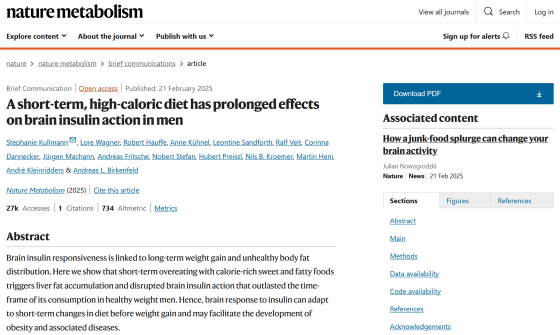Research results show that just five days of a high-calorie diet can make your brain more susceptible to obesity

When you feel stressed about work or relationships, or when you are so busy that you don't even have time to eat, you may end up eating too much junk food or sweets. You may think that if you eat a little too much for a short period of time, you won't gain weight, but a new study has found that 'after just five days of a high-calorie diet,
A short-term, high-caloric diet has prolonged effects on brain insulin action in men | Nature Metabolism
https://www.nature.com/articles/s42255-025-01226-9

Short-term dietary changes can lead to obesity, shows research
https://theconversation.com/short-term-dietary-changes-can-lead-to-obesity-shows-research-250939
Insulin is a hormone produced by the pancreas that promotes the delivery of glucose absorbed from food to cells and sends signals in the brain to regulate food intake. In healthy people, insulin functions normally, but in obese people, insulin resistance , which impairs the function of insulin, is seen.
People with insulin resistance in the brain feel the need to eat more food than they need, which makes them more likely to gain weight through overeating. It is known that the more fat cells there are in the abdominal area, the higher the insulin resistance becomes, but it seems that insulin resistance in the brain actually occurs before obesity occurs.
Therefore, a research team led by Professor Stephanie Kullmann , who studies diabetes at the University of Tübingen in Germany, conducted an experiment with a total of 29 male volunteers to examine the effect of continuing a high-calorie diet on insulin resistance in the brain.

In the study, 18 of the 29 participants were assigned to an experimental group in which they increased their daily calorie intake by 1,500 kcal, while the remaining 11 were assigned to a control group in which they continued to eat a healthy diet.
First, participants were scanned by MRI at baseline to measure insulin resistance, then those in the experimental group had to eat high-calorie snacks for five days, increasing their calorie intake by 1,500 kcal per day, and then scanned by MRI again to measure insulin resistance after the increased calorie intake. Finally, those in the experimental group had to eat a normal diet for seven days, after which they were scanned by MRI to measure insulin resistance after they resumed their normal diet.

The study found that subjects who dramatically increased their calorie intake over a five-day period experienced significantly worsening insulin resistance in their brains, a condition that was previously seen primarily in obese people.
The study also showed that the experimental group's insulin resistance remained high even after seven days of regular dieting, and although the subjects did not gain significant weight, they did experience a significant increase in liver fat.
'Obesity appears not to be solely caused by poor diet and lack of exercise,' said Kullman. 'The adaptation of the brain's insulin sensitivity to short-term dietary changes prior to weight gain also plays a major role in obesity.'

Although this study showed that insulin resistance in the brain persisted even after the diet was reinstated, previous research has shown that regular exercise improves insulin resistance . It can be hypothesized that this effect also applies to people before they become obese, so it is possible that combining a healthy diet with exercise may improve insulin resistance.
'The number of people worldwide who are obese has more than doubled in the past 20 years, and there is little evidence that this trend is about to end,' said Kullman. 'The internal mechanisms that drive obesity are more complex than simply poor diet and lack of exercise, and we must also consider the role of the brain.'
Related Posts:







